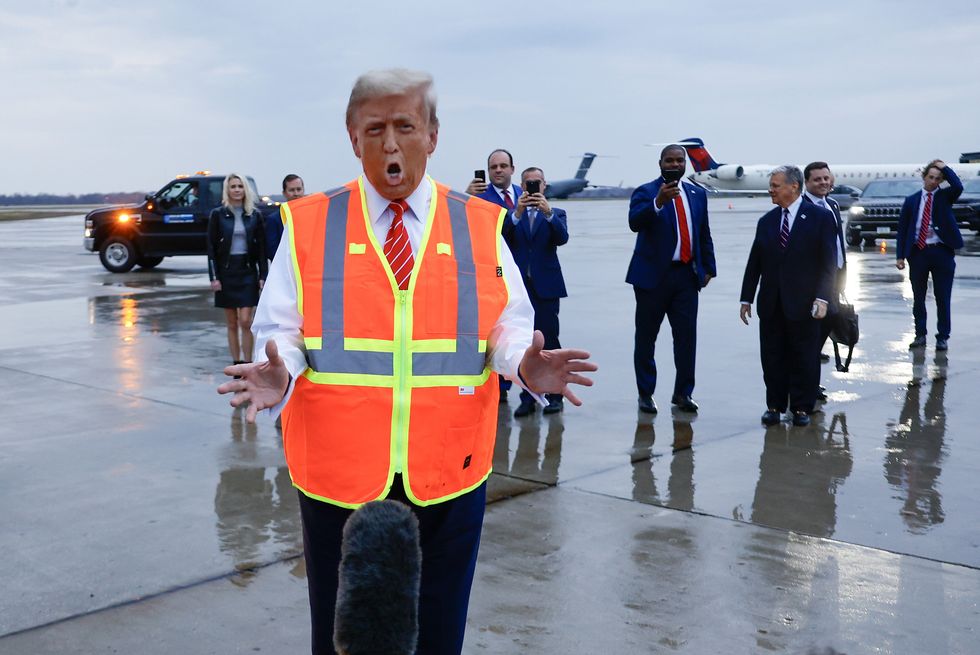Patrick O'Donnell
Guest Reporter
A new report from the National Institute of Economic and Social Research (NIESR) warns that President-elect Donald Trump's proposed policies could push the US economy into a recession.
The research suggests that in a worst-case scenario, US gross domestic product (GDP) could contract by two to three percentage points, compared to the current trend growth potential of about two per cent.
Ahead of his inauguration on January 20, the President-elect has reiterated his support for implementing tariffs once he returns to the White House in 2025.
Tariffs are taxes on imports entering a country and have been used by both Trump and President Joe Biden to bolster key industries in the US, as well address supposed unfair trade practices with other countries.
However, Trump has floated the launch of broad tariffs of up to 25 per cent on nations like Canada and Mexico, with China likely to be slapped with an extra 10 per charge on imports.
In a study, conducted by NIESR Fellow Paul Mortimer-Lee, potential benefits from the Republican Party leader's supply-side policies would be outweighed by negative effects from proposed immigrant expulsions and increased import tariffs.
Do you have a money story you’d like to share? Get in touch by emailing [email protected].

The analysis examines Trump's planned policy mix, including tax cuts, spending efficiencies, tariff increases, removal of illegal immigrants, and deregulation, concluding that the combined impact would be detrimental to economic growth both in the US and globally.
Furthermore, the report warns that the policy package would be "unambiguously inflationary", potentially driving inflation to 7 or 8 per cent by 2027 if Federal Reserve independence is weakened.
Import tariffs would directly increase prices by 1 to 1.5 per cent in the first year alone. The expulsion of illegal immigrants would severely impact key industries including construction, retailing, agriculture and distribution.
The research suggests that removing five million workers could reduce GDP by nearly 2.5 per cent. Labour supply reductions from immigrant expulsions would push up wage costs and prices by 0.25 to 0.5 per cent annually over several years.
These proposed fiscal policy changes, including approximately $1 trillion in new measures over ten years, would add pressure to an already fully-employed economy. The current US fiscal position is already concerning, with the federal deficit close to 7 per cent of GDP, according to the NIESR study.
Trump's proposed tax cuts would further worsen this position, as revenue reductions would exceed any gains from import tariffs. The analysis projects that the debt-to-GDP ratio would climb to 134 per cent by 2034.
This represents a 12-point increase compared to the latest Congressional Budget Office baseline. The combination of tax cuts and reduced revenue streams would place additional strain on an already unsustainable fiscal path.
In a stark assessment of the proposed policies, NIESR Fellow Paul Mortimer-Lee said: "Overall, the proposed policy package by Trump is likely to be ill-considered, rushed, and damaging to the US and global economies.
LATEST DEVELOPMENTS:

"The United States in aggregate will lose, but there will be winners as well as losers." He warned that consumers, particularly the poorest, would suffer from higher prices.
Corporates and wealthy individuals would benefit from tax reductions and deregulation, the economist claims.
In comparison, Morrtimer-Lee asserts that those competing with imports and immigrant labour would see gains.
Mortimer-Lee added: "Given the President-Elect’s past performance and evident desire for radical change, uncertainty is likely to be high, which may also contribute to damaging economic growth and asset prices.”
Find Out More...
The research suggests that in a worst-case scenario, US gross domestic product (GDP) could contract by two to three percentage points, compared to the current trend growth potential of about two per cent.
Ahead of his inauguration on January 20, the President-elect has reiterated his support for implementing tariffs once he returns to the White House in 2025.
Tariffs are taxes on imports entering a country and have been used by both Trump and President Joe Biden to bolster key industries in the US, as well address supposed unfair trade practices with other countries.
However, Trump has floated the launch of broad tariffs of up to 25 per cent on nations like Canada and Mexico, with China likely to be slapped with an extra 10 per charge on imports.
In a study, conducted by NIESR Fellow Paul Mortimer-Lee, potential benefits from the Republican Party leader's supply-side policies would be outweighed by negative effects from proposed immigrant expulsions and increased import tariffs.
Do you have a money story you’d like to share? Get in touch by emailing [email protected].

The analysis examines Trump's planned policy mix, including tax cuts, spending efficiencies, tariff increases, removal of illegal immigrants, and deregulation, concluding that the combined impact would be detrimental to economic growth both in the US and globally.
Furthermore, the report warns that the policy package would be "unambiguously inflationary", potentially driving inflation to 7 or 8 per cent by 2027 if Federal Reserve independence is weakened.
Import tariffs would directly increase prices by 1 to 1.5 per cent in the first year alone. The expulsion of illegal immigrants would severely impact key industries including construction, retailing, agriculture and distribution.
The research suggests that removing five million workers could reduce GDP by nearly 2.5 per cent. Labour supply reductions from immigrant expulsions would push up wage costs and prices by 0.25 to 0.5 per cent annually over several years.
These proposed fiscal policy changes, including approximately $1 trillion in new measures over ten years, would add pressure to an already fully-employed economy. The current US fiscal position is already concerning, with the federal deficit close to 7 per cent of GDP, according to the NIESR study.
Trump's proposed tax cuts would further worsen this position, as revenue reductions would exceed any gains from import tariffs. The analysis projects that the debt-to-GDP ratio would climb to 134 per cent by 2034.
This represents a 12-point increase compared to the latest Congressional Budget Office baseline. The combination of tax cuts and reduced revenue streams would place additional strain on an already unsustainable fiscal path.
In a stark assessment of the proposed policies, NIESR Fellow Paul Mortimer-Lee said: "Overall, the proposed policy package by Trump is likely to be ill-considered, rushed, and damaging to the US and global economies.
LATEST DEVELOPMENTS:
- Shocking drop in productivity revealed by ONS as net migration figures surge
- Morrisons updates loyalty scheme in savings boost for supermarket shoppers
- Man with 'no money left' shares 5-year journey to making over £100m on Facebook

"The United States in aggregate will lose, but there will be winners as well as losers." He warned that consumers, particularly the poorest, would suffer from higher prices.
Corporates and wealthy individuals would benefit from tax reductions and deregulation, the economist claims.
In comparison, Morrtimer-Lee asserts that those competing with imports and immigrant labour would see gains.
Mortimer-Lee added: "Given the President-Elect’s past performance and evident desire for radical change, uncertainty is likely to be high, which may also contribute to damaging economic growth and asset prices.”
Find Out More...